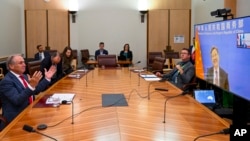Australian Trade Minister Don Farrell has been invited to China, boosting hopes that sanctions and tariffs on Australian exports are a step closer to being removed. Diplomatic tensions have hindered bilateral ties for several years, but the Canberra government has said it wants to “stabilize the relationship.”
Farrell told China’s Minister of Commerce Wang Wentao during a video conference Monday that both countries would benefit from more harmonious trading relations. It was the first time in three years that an Australian trade minister has held talks with their Chinese counterpart.
Canberra is eager for tariffs or unofficial bans to end on a range of Australian exports to China, including coal, barley, lobsters and wine.
Experts believe there are signs that relations are gradually improving. Wang invited his Australian counterpart to Beijing, and said he was “looking forward to professional, candid and practical exchanges of views.”
Australian Foreign Affairs Minister Penny Wong told the Australian Broadcasting Corp. Monday that Canberra is keen to reset relations with its biggest trading partner.
“We have always said in terms of the relationship with China we want to stabilize the relationship,” Wong said. “We’ve said we will cooperate where we can, we will disagree where we must and we will engage in our national interest.”
“We hope that the trade impediments will be removed. We believe it is in both country’s interests for that to occur,” she added.
Analysts say the trade restrictions are a consequence of bilateral diplomatic friction. Australia’s stance on various geopolitical issues, including Taiwan, human rights violations in China’s Xinjiang Province and Beijing’s ambitions in the South China Sea and South Pacific, have been a source of tension.
Then there was a call in 2020 by the former conservative government in Canberra for an inquiry into the origins of COVID-19, which was first detected in China. It deeply angered Beijing and restrictions on a range of Australian exports followed.
Analysts say recent high-profile meetings have suggested that relations are improving.
Last November, Australian Prime Minister Anthony Albanese met China’s President Xi Jinping on the sidelines of the G-20 summit in Indonesia.
China accounts for about a third of Australia's global trade. Government data shows that the export of Australian goods and services to China were worth US$123 billion in 2020-21.








